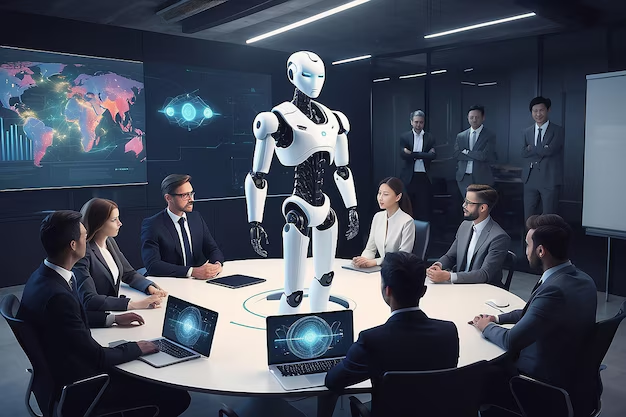As a matter of fact, Artificial Intelligence is the new elementary component in our daily activities. Influences will cut through every detail-from communication, shopping, and travel to time management-most of which are subtly done at the background as it makes life better somehow oriented towards efficiency, connectivity, and personalization without our thoughts. Whether it is your smartphone virtual assistant, the recommendation engine of your favorite streaming service, or even smart appliances in your home, AI surrounds us and subtly molds the way we live.
In this blog, we have culled a comprehensive coverage of how AI affects our daily routines and how this technology continues to evolve to make life easier, more efficient, and connected.
1. AI in Communication: The Future of How We Interact

Artificial Intelligence has changed the way we should communicate; easier, efficient, and accessibility to information is improved. AI has integrated virtual assistants already with smart communication tools through which we actually connect to others and manage tasks.
Virtual Assistants
Voice-activated AI assistants come in many forms. This includes Apple’s Siri, Google Assistant, and Amazon’s Alexa, which can send messages, remind you to do certain things, or check for weather updates; answer your questions or control appliances in the smart devices that are now in your home-through voice commands. This makes tasks easier, whether at home or away .
Smart Messaging
Today, AI chatbots are extremely mainstream in customer service and support. Such AI-based chatbots make it easy to reach quick fixes for users. Routine queries can be handled by AI chatbots, and they can also provide customized help support to customers while rendering services where human representatives are bypassed to provide execution. For example, WhatsApp and Facebook Messenger follow AI technology, which makes pop-up suggestions in messages for ease of communication.
Email and Document Automation
AI allows humans to manage their emails more effectively by filtering unwanted messages and promoting the important ones. For instance, Gmail uses AI in the screening of spam, which is simply a technique of prioritizing important ones and even suggesting the most frequently asked questions that one may need an answer to. Likewise, the AI tools regarding writing enhance the way one writes by enhancing the style and grammar and even the tone through Grammarly.
2. AI in Shopping: Personalising the Retail Experience

The retail industry has, in fact, used AI to enhance customer experience, whether it be online or through the physical outlet. The AI tools create shopping more rapid, personalized, and easy for a consumer.
Product Recommendation
AI-based recommendation engines on the websites of Amazon, eBay, or Netflix have changed the very pattern of how online shopping websites suggest some special movies, products, or shows to a particular viewer based on his or her history of browsing or purchasing. It takes into account the preference of users and behavior of other users like him, and mashes up the characteristics of the product to give these recommendations that incidentally fit each individual’s tastes and requirements so aptly.
Virtual Shopping Assistants
Many retail sites will even allow virtual shopping assistants that can aid in your quest for products. It might answer some questions about products, provide some options based on your preference, or maybe even assist in making a purchasing decision via providing comparisons or even the deal of the day. Among the popular AI-driven bots could be the many chatbots in these systems that build a more interactive and engaging experience with customers.
Visual Search
Visual search is not dependent upon keywords as its upload of the picture of a product to be searched relies on AI-based search tools. Pinterest or Google Lens, for example, use AI in order to analyze the image and bring returns of the visually similar products or objects. This technology proves helpful and very convenient for finding that piece of clothing, accessory, or furniture which one likes only with a shot of something.
3. AI in Home Automation: Intelligent Building of Smarter Living Environment

AI has developed as one of the most critical features of smart homes, which not only facilitates the homeowner to automate every possible aspect of the task but also improve energy usage efficiency or boost security. AI-powered devices in homes create a better experience in understanding how to live comfortably and to be connected.
Smart Thermostats
For instance, your Nest Thermostat will learn your patterns and habits over time to regulate the temperature accordingly for saving energy and staying cool. These AI-enabled thermostats allow you to pre-program your respective temperature conditions depending on the factor that whether you are present in the house or not, with an opportunity to optimize energy even when you are not around the town.
AI-Advanced Security Systems
These smart home security systems, such as Ring and Arlo, make surveillance and safety better through the use of AI in them. AI can recognize known faces, alert homeowners about unusual movements, and even shoot those people who are burglarizing via smart cameras. Such smart intelligence not only amplifies security levels but also thwarts false alarms.
Smart Appliances
These smart home appliances include an intelligent refrigerator, washing machine, and even a vacuum cleaner that helps in simple household chores. For instance, your smart refrigerator might give you recipe suggestions based on what is inside it, and a robotic vacuum cleaner uses AI to map out your home’s pattern so that the floors get clean without any human interference. Such appliances learn your habits and preferences, making it smoother to manage your home.
4. AI in Transportation: The smarter, safer way to travel
AI is transforming the face of moving people from one place to another by making transportation more efficient, convenient, and safe. Optimizing routes and going up to the heights of even aspired autonomous vehicles, AI has started to bring about an overhaul of the travelling experience itself.
Navigation and Traffic Management
One of the most helpful applications of AI currently is concerning new navigation apps such as Google Maps and Waze. This involves a machine learning algorithm, which scans live data over traffic, predicts congestion, and then advocates routes to reach a destination as efficiently and in the shortest amount of time. Not to mention these accommodate factors such as street closure, accidents, and even weather that may cause some delays to reach a destination more efficiently.
Ridesharing Services
Uber and Lyft use their interfaces to connect riders with drivers based on location, traffic, and demand distribution. This allows for peak hours of demand forecast and adjusts price variation automatically as peak hours increase for greater assurance of more drivers at those times. AI also optimizes routes for the drivers leading to lesser waiting time, fuel, and other consumption.
Autonomous Vehicles
While fully autonomous vehicles are still on paper, AI is currently applied to make a vehicle safer and more efficient. High-level ADAS, embedded with AI, not only keep drivers safe by sensing a collision, blind-spot monitoring, and lane-keeping assist but will eventually lead to self-driving cars where AI could very quickly navigate complex road environments without human intervention.
5. AI for Time Management and Productivity
The time will be utilized to the fullest to provide more productivity and productivity with the help of AI. From managing applications to AI personal assistant, life and work workflows would become even more routine with technology.
Smart Task Management
Apps such as Todoist, Microsoft To-Do, and Trello integrate AI into the setting of priorities by users, deadlines, and monitoring of goals implementation. Such apps analyze your workload and suggest how to arrange tasks in a manner productive enough. For instance, Google Calendar is an AI calendar that would even set up meetings automatically and even advise on some times for a meeting to be done according to an individual’s schedule and remind one when an important deadline falls.
AI-Powered Email Management
AI manages the email using the filtering of inboxes based on priority importance. Besides this, Gmail also has a facility called “Smart Reply.” It gives the ability to quickly reply to a message contextually from the e-mail messages. Another important facility provided by AI-based e-mail tools like Superhuman is better search; a user is prompted to send a particular e-mail or attachment with minimal effort.
Personalized Learning and Development
Learning sites like Duolingo, Coursera, and Khan Academy, using artificial intelligence, keep the experience of learning much more customized because lessons structures can be changed according to the student’s specific needs and progress. They adjust their pace automatically for your learning speed and style and thus master new skills better.
6. AI in Entertainment and Media

Artificial Intelligence is changing the face of media and entertainment because it changes how people consume content, discover new media, and engage with their digital experience.
This is where the actual work of AI comes in: recommendation algorithms such as Netflix, Spotify, or YouTube. A streaming service applies algorithms fueled by AI to suggest you content that is precisely tailored to your tastes, based on your viewing or listening history. The recommendation systems analyze what you like, what users with similar tastes enjoy, and what’s trending to give you their best suggestions adapted to your tastes.
AI-Generated Content
Today, AI not only curates but also generates content. Websites such as DALL·E, ChatGPT, and so many others take the limits of AI-generated art, writings, and music to an ever-increasing level. Even though it is still in its infant age, AI-generated content is becoming quite sophisticated over time, therefore allowing individuals and businesses to use AI within their creative projects – from writing a blog, to a music piece, or whatever design.
Conclusion: AI Taking Over in Daily Life
AI became incredibly deep in our daily life for the sake of accomplishing things easily, improving the act of decision-making, as well as making things easier in ways we mostly miss. Smart home devices and virtual assistants, personalized shopping experiences, AI-enriched transportation and many more would be seen as an application of AI in daily life that would only keep increasing.
The impact AI will have on how to live, work, and interact with others will only keep deepening with advancing AI technology. It’s very clear that it’s much more than just a geeky tool; rather, it’s a tool shaping the fabric of modern society: making this world efficient, personalized, and highly connected. The possibilities that come about with the innovations that will surely emerge with future AI are endless, but if this is continued to be implemented in people’s lives, then there will only be more innovations that change the way people interact with this world.


